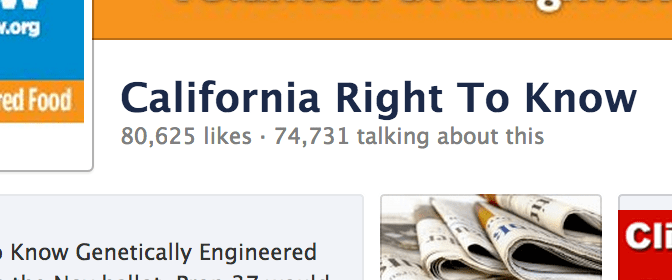Genetically modified food promises to cheaply feed the world, but is it dangerous? The agriculture industry will tell you no, organic food advocates will tell you yes, and science won’t give you a firm answer because test results are inconclusive so far.
TechCrunch, meanwhile, won’t tell you much on food tech topics like this because we usually focus on what’s interesting in Silicon Valley (which hasn’t been an agriculture hub for the last 70-odd years).
However, one long-time tech entrepreneur is trying to draw attention to the issue using the latest social media tools, and has gotten some interesting results from Facebook’s new Promoted Posts feature (which gives us a convenient angle to cover the larger issue).
Ali Partovi, the founder of LinkExchange and iLike, and an investor in name-brand companies like Facebook, Zappos and Dropbox, has been campaigning for a California proposition that would require food suppliers to tell consumers when they’re eating food made from genetically modified organisms.
If the state’s voters approve it this November, Proposition 37 will require labels on raw or processed food made from plant or animal products containing GMOs. It will also prohibit labeling or advertising GMO-derived food as “natural.” While supporters claim the law could create onerous labeling issues for the industry (unlikely), that’s also a problem that they’ve solved for the 60 other countries where similar labeling is already required, including all of Europe, Russia, India and China.
More obviously, disclosing GMOs in food could give consumers pause, and hurt corporate sales, as organic food advocate Michael Pollan noted in this great New York Times piece last weekend.
But beyond the specifics of this issue, the campaign has also turned into a fascinating TV and social media PR battle — that Partovi is splicing himself into the middle of.
The proposition was started by a California mom and built a grassroots movement that has won a million signatures and raised $5.5 million from people who care about food and health. Meanwhile, chemical companies industrial agriculture leaders including Monsanto, DuPont, allies like Coke, Pepsi and General Mills, and basically every other food industry giant in the U.S. have pooled more than $35.6 million as of a few days ago, and have gotten busy blasting TV ads across the state to raise doubts about food labeling.
Partovi, who has taken a personal interest in sustainable agriculture over the years, is fighting back using the tools he knows best (he jumped on the Facebook platform in 2007, for example, to make iLike the dominant music service of that era).
He’s created an absurd, irreverent homemade video that features, er… just watch the video… and paired it with Indiegogo for crowdfunding, he’s trying to raise up to $100,000 including half that in matching funds to support the proposition. He’s also asking supporters to use Facebook’s new Promoted Post feature, launched earlier this month, which lets anyone pay $7 to gain wider distribution in their friends’ news feeds.
The results? “The ads on FB are taking off,” he tells me. “Our ads have a click-thru rate of 4% — that’s 20 times better than the internet average — at a cost of only $0.15 per click. I can’t remember a more successful campaign since I helped start internet advertising in 1996.”
Because the people seeing these ads have been clicking “Like” and “Share” to pass them forward, he says he’s getting twice as many people seeing the ad for free versus other forms of advertising.
He and other campaigners are also running a Facebook contest called “Show Us Your Wits,” that asks supporters to post content about their support of the bill. Combined with the other Facebook marketing efforts, it’s now generating nearly as many people talking about the campaign (74,000) as have Liked the campaign’s Page (80,000). This is many times higher than most campaign pages you’re seeing during this election cycle.
The election isn’t for another few weeks, but this is looking like a good example of social media helping grassroots efforts to counter industrial-era influence/lobbying machines. Of course, having a few savvy tech types involved doesn’t hurt, either.
Disclosures: I’m not inherently opposed to GMO food, and the technology holds a lot of promise for the future. But I also have a long history of being involved with organic alternatives. My dad owned a produce market when I was a kid, and it mostly sold organic food. I also personally sold organic produce at a farmers’ market for a local farmer while I was in high school. Separately, my uncle is an active organic farmer at Fiddler’s Green Farm and my family owns a stake in it. Finally, I have invested in a friend’s organic meat ranch, Afton Field Farm.
